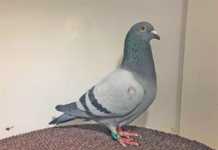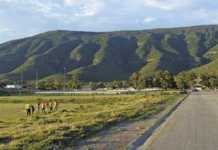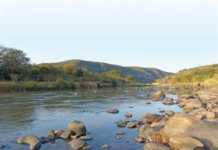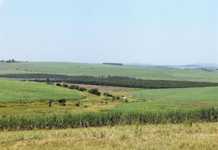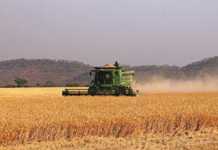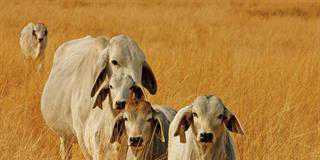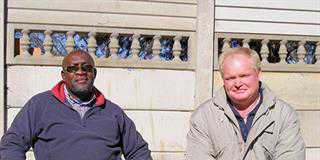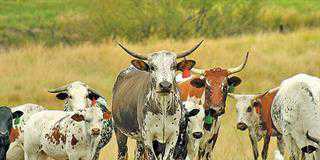Guy Butler
Butler was a 20th Century poet/writer/teacher who grew up in Cradock in the Eastern Cape, a period of life he described memorably in his autobiography, Karoo Morning. In his lifetime Butler was criticised for expressing dated or even ‘colonial’ ideas, but recent academic studies have challenged this judgement and praised Butler’s work for, among other things, its reverence for the natural world. The Farmer is one of Butler’s poems that provides grist to the mill of his critics because, according to one, the farmer’s stare – “some infinite assurance reached him through his eyes… he’d taken all that he saw into himself” – can be read as a gaze of dominion and obsession. You be the judge…
The Farmer
The sandstone step, festooned with bits of biltong,
is the bridge of his Liner, from here he pilots
three thousand morgen of good Karoo veld
through sizzling doldrums of drought and stormy good seasons;
barks laconic orders at the ‘boys’
who, wringing stained hats in yellow hands,
Cringe on the blue gravel deck three feet below him.
That Hottentot crew hold him in their hearts
as a bastard child of terror and love.
He drinks black coffee at intervals until sundown;
then brandy is brought, and he tunes in to hear;
the news of the great nonsensical world; he ponders long
till the southeaster rises and rattles the bluegum leaves
across the pebbled stars, and thinks
of Abraham and of Job
His unloved wife is large and sad,
an excellent cook, a compulsive eater.
One surly son is managing a distant farm;
biding his time; another doing quite well as a butcher,
has married a new wife; his only shameless daughter
Is living it up among the neon lights
down at the wicked Bay.
A caricature? Of course. It is equally easy
to embalm him in warm sentiment.
I found him intriguing, liked him more each visit,
but never quite knew why until I turned my gaze
away from the clean slow folds of the veld
and looked, as a painter might, acutely,
at the heavy body in old bleached khaki,
elbows on knees, the brandy glass
held by both hands in front of him, firm.
At first glance his eyes seemed like a hunter’s,
every wrinkle and line from crowsfoot to frown
pointing towards the clear grey orbs, alert,
watching something loved but treacherous.
He stayed like that for minutes without a movement –
relaxed and calm, enormously strong in his peace:
no, not like a hunter; not like a Buddha either,
nor like a saint in ecstasy, although
his poise was absolute.
Some infinite assurance reached him through his eyes.
The arc of the horizon, that particular
configuration of ironstone and grey shale,
pale soil stippled with dark round shrubs,
red grass in seed shaking along the jagged ridges –
he’d taken all that he saw into himself
and found that it was good:
it was water and breath of life to him,
he drank and breathed the distance through his eyes.
Suddenly I felt ashamed as if I had stared
with the wrong sort of interest
at a praying child or stumbled upon lovers
with all their defences gone.
I looked away, at what he was looking at.
And now I can never think of him
without the clearest vision of those hills,
nor recall those hills without seeing him.
From my public, urban world
their relationship seems real.
Douglas Livingstone
Livingstone was another poet whose work attracted criticism for not being sufficiently ‘politically engaged’. He wrote a great deal about untamed nature, often to convey his view that Africa was a place of violence. In ‘Sjambok’ he does this by having his narrator – a tour guide – discuss the uses and contested legacy of southern Africa’s legendary cattle whip.
Sjambok
(A colonial essay)
A whip of plaited leather terminating
in a single thong, you pronounce the thing
shambok and you can buy them at
the Victoria Falls or any tourist trap
but a hundred good cracks and you are left holding
a cheap skein of lousy Egyptian cotton
wilting at unstrategic and weathered
corners, and whoever heard of a leather
whip with corners? These are not really
properly cured: chew them and they
are not salty enough, and with the faint
rancid flavour of animal fat
which should have been eliminated in
the diligent scraping and an indulgent sun.
Nowadays, paradox this, the best ones
are made in Australia, out of kangaroos
– strange pouched upright giant mice –
or, hell! What does a kangaroo look like
anyway apart from a gonetoseed prize-
fighter, too heavy in the arse?
Perhaps you have heard the old sjambok tales;
bleeding and crucified on wagon wheels,
the early farmers flayed their blacks into death;
soandso’s grandfather kept
five men equipped with the stabbing assegai –
a marauding Matabele patrol – at bay
with a twelvefooter; and somebody else sliced
his brother into thick crimson strips
with one for loving his wife too well. Shades
of Cain and Abel and all that jazz.
The sjambok was a subcontinent’s tool
and like the freemason’s trowel
has been promoted or relegated,
depending on which side of all the elevated
wrists your granddaddy stood, to a symbol.
It looks good on a wall and is still
the only goad the phlegmatic oxen apparently
understand. Of course, it is excellent
for killing snakes – the oldest symbol – lifts
off their heads in one if you are in practice.
Modikwe Dikobe
Modikwe Dikobe was the pseudonym of Marks Rammitloa, a novelist, poet and trade unionist, who also worked variously as a hawker, clerk, domestic servant and night watchman. His poem ‘Grave of unknown whiteman’ is disarming for its colour-blind attitude towards the elderly and to hard work.
Grave of unknown whiteman
Rest in peace, old man
A heap of rocks on your grave
Is a token of respect
Bestowed on you.
You chose this part of the country
For a home
On a slope of those rocks
Was your community
And across that road
You sowed corn
And watered your cattle in that pan.
In years of dearth
We shared together
Helped each other in time of need.
Rest in peace, old man
Your kindred are here
Paying due respect
Rest in peace!
Charles Mungoshi
Mungoshi was born into a farming family and grew up near the town of Chivhu to the south-west of Harare. His work tends to be less stridently anti-colonial than that of his peers. Where many post-colonial Zimbabwe poets tended to focus on what was taken from black Zimbabweans in the course of that country’s colonial history, Mungoshi’s much-anthologised ‘If you don’t stay bitter and angry for too long’ focuses on what has not been destroyed: the fabric of rural life. I was fortunate enough to meet Charles before he died and was impressed by the richness of his voice. If you follow the links you can hear him read two quite beautiful poems that demonstrate the depth of his feeling for the rural life:
* http://www.poetryinternationalweb.net/pi/site/poem/item/11937/auto/MOUSE-TRAPPING
* http://www.poetryinternationalweb.net/pi/site/poem/item/11931/auto/A-KIND-OF-DROUGHT
If you don’t stay bitter and angry for too long
If you don’t stay bitter
and angry for too long
you might finally salvage
something useful
from the old country
a lazy half sleep summer afternoon
for instance, with the whoof-whoof
of grazing cattle in your ears
tails swishing, flicking flies away
or the smell of newly tamed soil
with birds hopping about
in the wake of the plough
in search of worms
or the pained look of your father
a look that took you all these years
and lots of places to understand
the bantering tone you used with your
grandmother and their old laugh
that said nothing matters but death
if you don’t stay bitter
and angry for too long
and have the courage to go back
you will discover that the autumn smoke
writes different more helpful messages
in the high skies of the old country.
Jacob Daniël du Toit
Du Toit was better known by his pen name, Totius. He wrote a great deal about the relationship of farmers to the land. In the following poem you’ll almost be able to taste the sweetness of dried peaches.
The woe of the trekker
(an extract)
Lost small upon the Rand
lies the little house in the trekker’s
land
It is only a speck in the openness –
the thatched roof and little walls of
clay
[…]
[the calves lie] so dumb-tranquil; and joyfully
alarmed
leap up from the rough veld only
when
the cattle come trotting
filling the eventide with their lowing.
A little further from the house
where leaves of corn clearly rustle
when the wind raises the sound of
their song
above the faint rumble of the veld
[…]
A single peach tree turned towards
the sky
bears there its golden-yellow fruit
and offers, dried, in wintertime,
a rarely obtainable sweetness
there is the little farm that nestles
there
so restful in the wide expanse –
a little kingdom in itself
over which stretches a clear heaven.
WEG Louw
W.E.G. Louw was the younger brother of renowned South African writer NP van Wyk Louw. In ‘To be a farmer’ he connects farmers not only to the natural world but to God.
To be a farmer
(an extract)
Oh to be a farmer who works
with his hands in the sun
the loved, long day; at dusk
to come back tired
from the land, and sleep
until the red dawn breaks through
the windows
and at the second cock’s crow, over
the frost
to hold the plough handle fast…
Oh to be a farmer and to work
in God’s sunshine and rain;
and never to doubt that He knows
what is best; and still to believe
when his heart would break,
and to feel that he, farmer alone,
can speak with God, and give
thanks
as the rain pours down.

